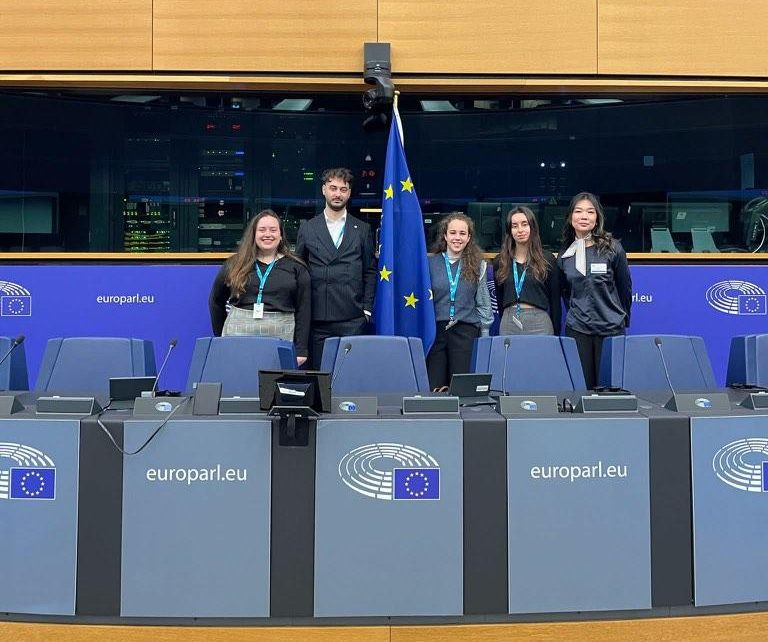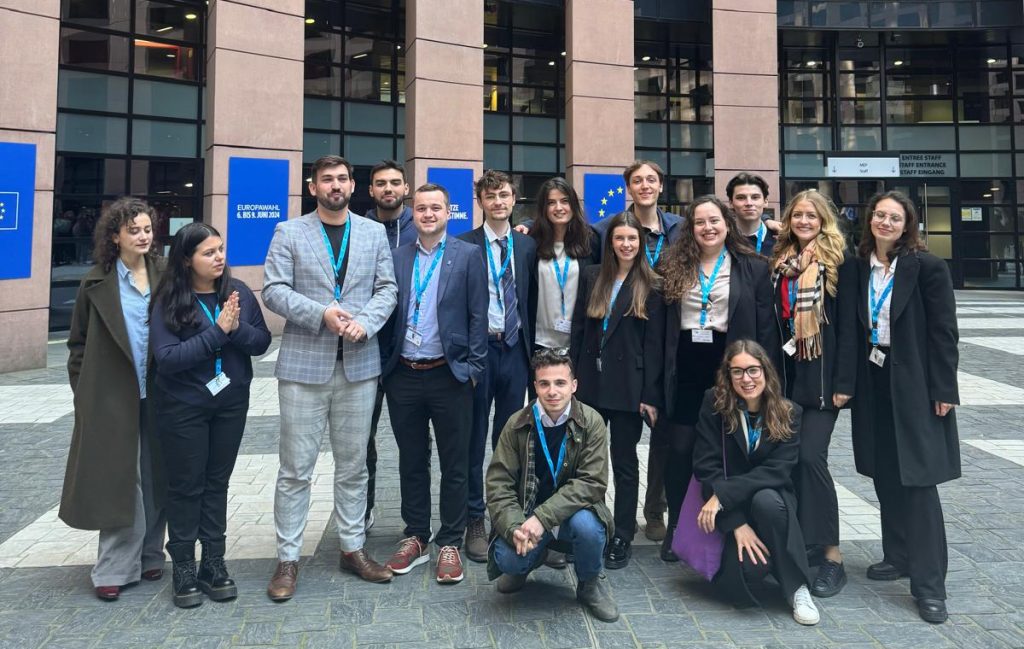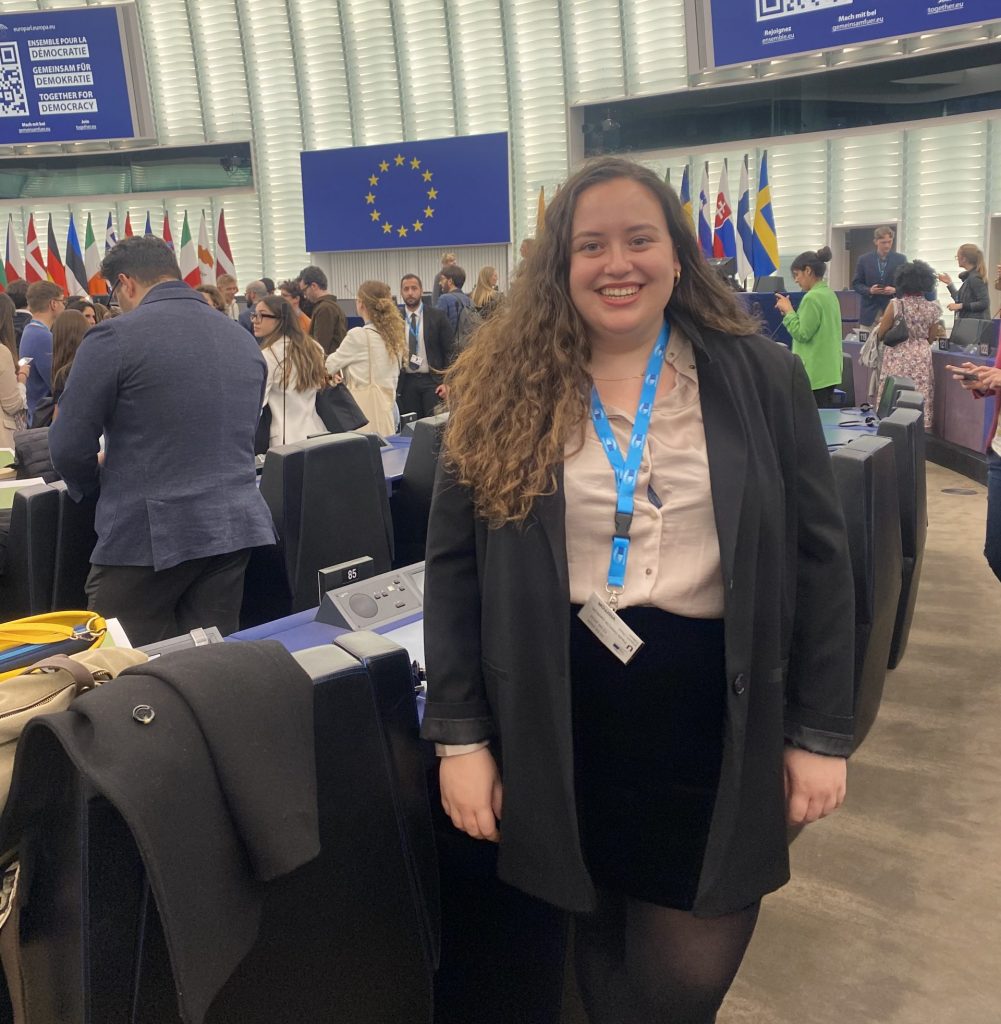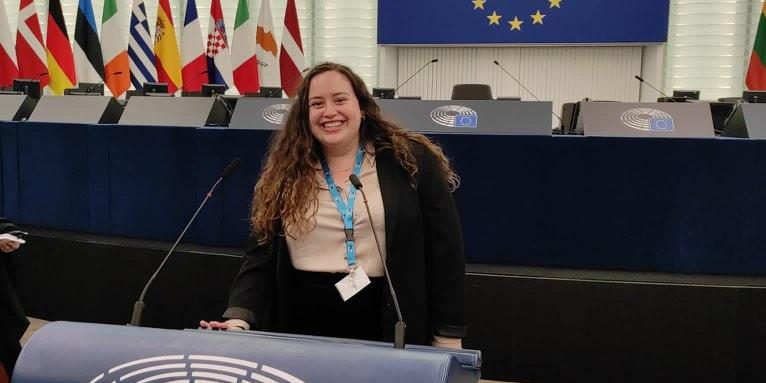Between April 10-12, the 3rd edition of the European Student Assembly was held at the European Parliament in Strasbourg, a forum attended by over 250 students from alliances of European Universities to discuss current issues and develop policy recommendations for the future of Europe. Paula García, UPM student, shares with us in this interview conducted by EELISA UPM’s Communication Officer Elena Mora Cuesta, her experience participating as an EELISA representative in a panel dedicated to the European Election Year, crucial for deciding the direction of the European Union in the upcoming elections.
Q. How did you get selected among the more than 2250 applicants to go to Strasbourg to bring the concerns and proposals of young people?
A. I found the call to participate in the Assembly through UPM’s social media. It immediately caught my attention; it was an event I had never heard of before. I had previously been part of similar forums with a European theme and considered myself in a suitable position to apply, as it involved contributing from my background in sociology and international relations. I quickly identified it as an opportunity to enrich myself and contribute, all with the aim of building a more democratic and inclusive European Union.
On the other hand, it was also an unparalleled opportunity to spend a few days getting to know the charismatic city of Strasbourg and being surrounded by an international context with young people from many other countries, whom I can now consider my friends.
Q. It must have been exciting to finally materialize in Strasbourg after so much work and months behind a screen. How was it?
A. We met in April, and walking through the streets during those days was incredible. Everywhere we looked, there were young people from all over Europe who had come to one of the hearts of the European Union with a common goal: to bring the voice of university students to the institutions. Panel 1 was made up of Italian, Swedish, Romanian, Greek, French students… It was also very interesting to work with them, not only because of the novelty of their origins but also because we all had very different academic backgrounds. This meant that, although there were many participants specializing in International Relations and other branches of Social Sciences, there were also students from engineering, humanities, health sciences, and fine arts, among many others. Therefore, it can be firmly stated that the ESA is not just an assembly; it is a meeting of cultural and interdisciplinary diversity that splendidly showcases what the European Union represents: united in diversity.
Motivation and academic excellence were considered for the selection, in addition to ensuring the best representation of genders, ages, countries, university education levels, and fields of study. In January, we received a notification indicating the panel we had been selected for, in my case, the one dedicated to the European Electoral Year.
A few days later, we started the online sessions, intense months of work filled with workshops, seminars, and preparatory meetings with my panel colleagues and experts who helped us enrich and develop the proposals that we would later bring to the ESA. We conducted a research exercise to identify what actions should be taken by political leaders at different levels of government, but also from our universities and the student body; to promote participation and combat misinformation ahead of this upcoming electoral event.
“The ESA is not just an assembly; it is a meeting of cultural and interdisciplinary diversity that splendidly showcases what the European Union represents: united in diversity.”

Paula, along with students from other institutions in the EELISA alliance who also participated in the ESA: Andrei Ionescu from Universitatea Politehnica din București (UPB); Jeanne de Villeneuve from Université Paris-Dauphine (PSL); Nora Donelli from Scuola Superiore Sant’Anna (SSSA); and Aigeim Marat from Budapest University of Technology and Economics (BME).
Q. How does the Assembly unfold?
A. The assembly took place at the European Parliament headquarters in the city. It was three days full of activity. The students occupied all the spaces provided to develop the different proposals for our panels. They also held meetings with other colleagues and contributed to their ideas, debating the most intricate issues and preparing every detail to finalize the document. Once this part of the work was completed, which extended over the first two days of the assembly, one of the most exciting moments arrived: the voting. All gathered in the hemicycle, we had to approve or reject each of the proposals one by one through a voting system used by the actual members of the European Parliament. Some results were very close, while in other instances there was clear unanimity. In this way, Panel 1 managed to pass 8 out of our 9 initiatives. The Assembly concluded that same day, leaving an excellent impression on all participants.
Beyond the formal proceedings, the organizers of the European Student Assembly provided us with an interesting program of extra activities. We enjoyed a guided tour of the beautiful city of Strasbourg, which was incredibly lovely with the burst of spring. There was also a cocktail event with former participants from previous editions, where we could exchange impressions about our experiences and much more.
Q. What do you take away from this experience? Would you recommend it to your peers?
A. Participating in the European Student Assembly has been a unique and unparalleled experience for me. I am deeply grateful to the Universidad Politécnica de Madrid and EELISA for giving me this opportunity to grow both professionally and personally. For someone like me, who has always been very interested in the functioning of European institutions, facing a context like this has been a transformative challenge. Working with people from different backgrounds and profiles than mine could have been more complicated than it actually was at the beginning. The fact that we all had a clear understanding and showed a high level of commitment to the cause that brought us together was key to the excellent development of our work and the Assembly itself.
It is important to recognize that the European Union is not something distant, but an umbrella that is present in every moment of our day, from drinking water from a bottle to visiting a public park funded by European funds.
This opportunity has allowed me to explore beyond and immerse myself fully in developing solutions for the most significant challenges facing the European Union, making it clear that young people are not the generation of the future; we are the voice that must be heard in the present. The richness of perspectives contributed by my different colleagues, along with the various training workshops offered, has provided me with a now indispensable variety of tools and skills that I am sure will be of great use wherever life takes me. That is why I tirelessly encourage the rest of the students from our university and our alliance to embark on this type of adventure, to take advantage of these spaces to make themselves heard, to discover, and to grow.

Paula with other students who participated in the ESA.
Youth needs to empower themselves and occupy these kinds of spaces, not only to express their concerns and interests but to actively take part in decision-making and policy design that affects us all. It is important to recognize that the European Union is not something distant, but an umbrella that is present in every moment of our day, from drinking water from a bottle to visiting a public park funded by European funds. Events like this third edition of the European Student Assembly demonstrate that the range of topics managed by the organization is practically infinite and that each of us has at least one area where we can contribute.
From my experience in Panel 1, on the European Election Year, I believe these upcoming elections are crucial and decisive for the direction of the European Union. In a context of multiple crises and polarization, voting in the elections is fundamental to determining the future we want for the organization.
About Paula García
Paula García is a student of the Master in Strategies and Technologies for Development: cooperation in a changing world, taught jointly by the Universidad Politécnica de Madrid and the Universidad Complutense. Graduated in Sociology and International Relations, she has participated in several initiatives related to the European Union, including the Erasmus+ programme. She even co-organised the European Youth Event that took place in Santander in 2022. She currently combines her studies with the management of the Jean Monnet Centre of Excellence for European Interdisciplinary Studies in Madrid.


